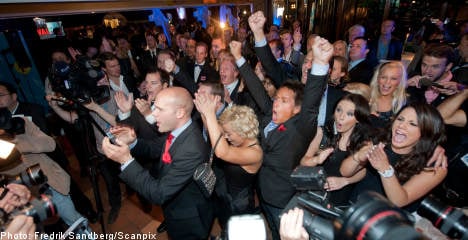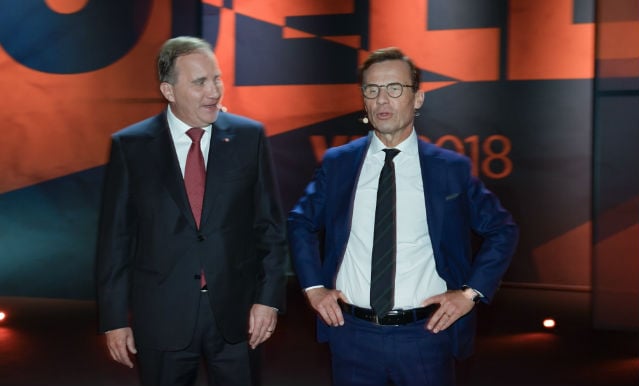Prime Minister Fredrik Reinfeldt, 45, should see his four-party Alliance become the first right-leaning government to win a second term in nearly a century.
However, with just 49.1 percent of the vote, according to exit polls broadcast on Swedish public television, Reinfeldt’s coalition is likely to fall narrowly short of a majority of seats in parliament.
His task will also be complicated by the fact that the far-right Sweden Democrats appeared to have clearly passed the four-percent barrier needed to get into parliament.
Even with a handful of parliamentary seats, observers have cautioned the far-right party could play kingmaker or spoiler, forcing Reinfeldt to seek new alliances or even make it so difficult to govern that new elections would need to be called.
Meanwhile, Reinfeldt’s win spells a decisive end to the rival Social Democrats’ 80-year domination of Swedish politics and their role as caretakers of the country’s famous cradle-to-grave welfare state.
The party, which for the first time had created a coalition of left-wing parties to increase its chances of winning power, suffered a historic loss according to exit polls, which showed it had garnered just 30 percent, down from 35.3 percent in 2006, when its score was already one of its weakest on record.
However, the party is still the most popular single party, with the Moderates next at 29.1 percent.
Jan Eliasson, a former Social Democratic foreign minister, insisted late
Sunday the apparent poor showing for his party would not weaken Sahlin’s position.
“She is a strong and very admired leader and she has really shown herself to have prime minister qualities during this campagn,” he told Swedish public television.
Voting appeared slow during the day Sunday, but turnout is traditionally around 80 percent in Sweden and 2.2 million of the 7 million electorate had already cast their ballots in advance.
However, the total voter turnout was not expected to be clear for several hours, an election official said Sunday, pointing out that there are only paper ballots in Sweden.
Towards the end of the campaign, focused largely on the economy and the future of the welfare state, both Sahlin and Reinfeldt stressed the importance of achieving a majority government to offset the sway of the far-right Sweden Democrats.
The anti-immigrant party won around 4.6 percent in Sunday’s vote, exit polls showed, which is enough to secure seats in parliament.
“Our aim is to become Sweden’s biggest party,” Sweden Democrat member Mattias Karlsson told Swedish pulbic television at the party’s election party, adding he expected that could happen “2018 perhaps”.
Another high-up in the far-right party, Bjoern Söder, also rejoiced over the poll numbers, pointing out, “At the last election, the Sweden Democrats votes were underestimated in the exit poll…I think that our numbers are going to increase.”
During the campaign, both Reinfeldt’s coalition and Mona Sahlin’s opposition bloc promised not to cooperate with the far-right, opening the way to re-worked coalition blocs and possibly even new elections.
Reinfeldt has hinted he would try to cooperate with the Green Party if his coalition falls short of a majority, while Sahlin said she would try to woo over the Liberal and Centre parties.
However, political scientist Tommy Möller pointed out that the numbers so far come from exit polls, stressing, “It is still within the frame of possibility for the Alliance to win a majority.”
Near final election results were expected within a few hours, but the conclusive results were not likely to be clear until Wednesday at the earliest, according to election authorities.



 Please whitelist us to continue reading.
Please whitelist us to continue reading.
Member comments